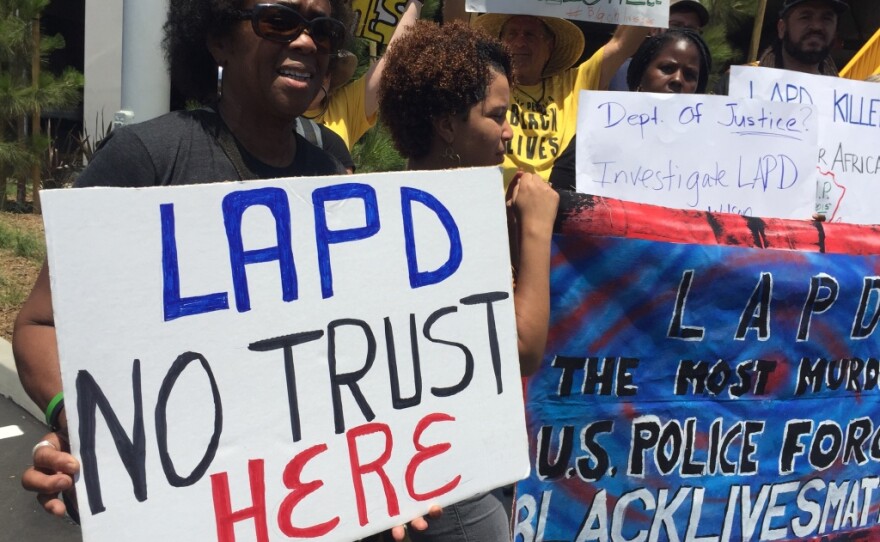A new survey commissioned by KPBS, KPCC, KQED and Capital Public Radio has found Californians, like much of the nation, are divided by race when it comes to their views of police profiling and excessive use of force.
When asked about racial profiling, 68 percent of Californians said it is a “huge” or “significant” problem in the U.S. Twenty-five percent of state residents polled said it was a "minor problem" or "not a problem at all."
The Institute for Social Research at California State University, Sacramento conducted the survey Aug. 15-24. It has a margin of error of plus or minus 4 percent. A broad sample, including 92 percent registered voters, responded to questions on issues that include police profiling and excessive use of force.
More than half of the black respondents — 58 percent — said profiling was a huge problem in the country. Just 19 percent of white respondents said the same. Among Latinos, 36 percent of those polled said it was a huge problem.
A significant difference in age groups also exists. Forty-three percent of people 18-25 said profiling is a huge problem compared to 14 percent of people age 65 and older.
When asked about excessive force by police towards people of color, 66 percent of respondents said it was a huge or significant problem in the U.S. Twenty-seven percent said it was just a minor problem or not one at all.
Minority and women respondents tended to see police profiling and excessive use of force as more of a problem than white men — whether they were Democrats or Republicans, Barker said.
But fewer respondents think these same issues are a significant problem in California. Fifty-nine percent identified racial profiling as a huge or significant problem in the state. Fifty-two percent of respondents said excessive use of force was a huge or significant problem in the state.
“The fact that we are a rather progressive state probably leads the average person to think that ‘oh that’s a problem they have elsewhere',” Barker said. “They may think we are more respectful of diversity."
Melina Abdullah, a Black Lives Matter leader in Los Angeles, said some people have an incorrect view of reality in the Golden State.
“There is this façade of diversity and inclusion within California — that’s how California is painted by Hollywood,” Abdullah said. “It’s all beaches and palm trees and all kind of folks.”
“In actuality, California is home to the most murderous police department in the country: the LAPD,” she said. “People forget Rodney King and other acts of brutality, too.”
One retired police captain said there is less excessive force than people think.
"People in minority groups tend to express more concern than others because there tends to be more negative interaction with the police in higher crime areas," said retired LAPD Capt. Greg Meyer, who now testifies in use-of-force lawsuits. "People’s opinions tend to be based on personal or second-hand experience and tend to be very media driven."
Meyer added that the media "generally (does a) poor job of interpreting police work." Reporters in turn have long complained police departments fail to explain thoroughly how shootings happen.
People are also divided over the Black Lives Matter movement, which began advocating against profiling and excessive force by police in the wake of the 2014 police shooting of 18-year-old Michael Brown in Ferguson, Missouri. Brown was black. Officer Darren Wilson, who was cleared of any wrongdoing, is white.
About a third of respondents view the movement warmly, while another third view Black Lives Matter coldly. Twenty-four percent are uncertain or ambivalent.
The police-backed "All Lives Matter" movement gets more support. A little over half of respondents view it favorably, compared to 25 percent who view it negatively.
“This is not unexpected,” Abdullah of Black Lives Matter said. “This is very reflective of our work and what we run into.”
The survey also examined a variety of propositions on the November ballot, including two addressing criminal justice issues. Both Proposition 63, a gun control measure and Proposition 57, a sentencing reform proposal, are strongly supported by respondents.

Proposition 63 would prohibit the possession of large-capacity ammunition magazines and would require most individuals to pass a background check and obtain authorization from the California Department of Justice to purchase ammunition.
Proposition 57 would increase parole chances for felons convicted of nonviolent crimes and give them more opportunities to earn credits for good behavior. It would also allow judges, not prosecutors, to decide whether to try certain juveniles as adults in court.

The Institute for Social Research at Sacramento State fielded the survey online and through the mail Aug. 15-24, 2016, using the CALSPEAKS survey panel. It yielded 915 completed surveys and 44 partially completed surveys. CALSPEAKS obtains a representative sample of Californians, stratified by the five major regions in the state. For information on the methodology, please visit its website. The margin of error for the distribution of responses on any individual survey item is equal to or less than +/- four percentage points.







